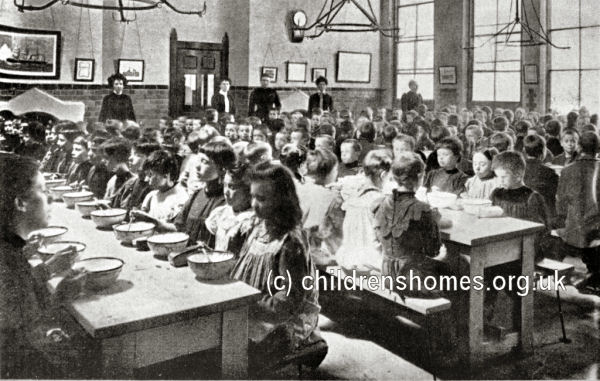Addison Street Day Industrial School, Liverpool, Lancashire
In 1891, the Liverpool School Board opened a Day Industrial School at Addison Street, Liverpool. Housed in a 'very handsome and substantial' building, erected for the purpose, the School was certified to begin operation on March 6th, 1891, with accommodation for 300 children. The School opened its doors on March 23rd and by the end of the year, the number on the roll was 217, comprising 132 boys and 85 girls. The School's first superintendent was Miss Martha Tarry who for the previous ten years had been in charge of the Board's Bond Street Day Industrial School.
The School worked from 8 a.m. until 6 p.m. Monday to Friday, with Saturday being a half day. The children were provided with classroom lessons, industrial training, and three meals each day. As well as classrooms, the premises included a dining-hall and kitchen, large assembly room, washrooms, swimming bath, and a good manual instruction room for woodwork, which was used as a centre for other schools. There were good-sized separate playgrounds for boys and girls. About three dozen boys attended the manual instruction class twice each week, and also learned linear drawing. The girls received careful in sewing and knitting, and assisted the kitchen and laundry.
An 1896 report described the Addsion Street as the most modern and spacious of the Board's Day Industrial Schools. The number attending was in decline, however, with only 130 on the roll in October of that year. There were good yards with covered sheds, and a large swimming bath. The School's manual instruction centre could accommodate 32 boys. Some mat-making was carried out, but now only for the school itself. From 18 to 24 girls received a course of lessons in cookery from the Board's special teacher. Girls also gained practical experience in knitting, sewing, and washing, and the work of keeping the large building clean was done by the children. Situations were found for the children, but none of these on licence were licenced to work. Musical drill, dumb-bells, clubs etc. for boys and girls was well attended to. Two weeks were spent under canvas on the sea coast each summer. Only half-day attendance was required during holidays, and bank holidays were voluntary days.

Addsion Street Day Industrial School, Liverpool, c.1900. © Peter Higginbotham
Miss Tarry was still superintendent but by 1920 she had been succeeded by one of the School's teachers, Miss K. Kearney.
In June 1917, when the First World War had begun to cause food shortages and rising prices, the Liverpool Council's Special Committee as to Food Kitchens and Coal Supply agreed to establish kitchens at the Addison Street and South Corporation Day Industrial Schools to provide cooked food for local people at a reasonable price. In September of the same year, the winter session of evening continuation and technical classes began at the two Schools. These were aimed at boys under 15½ years of age who had left day school. A new feature of the programme was the 'handyman' classes which had been commended by the Chief Scout, General Baden-Powell.
On 31st October, 1933, the School was certified as a Day Approved School. Approved Schools were introduced by the 1933 Children and Young Persons Act to replace the existing system of Reformatories and Industrial Schools. Addison Street is thought to have been the only Day Approved School to have been set up, all the others being residential establishments.
The School gave notice on 7th December, 1934, of its intention to resign its Approved School certificate and it this came into effect on March 31st, 1935. The School is sometimes referred to as the last day industrial school to close in England.
The site was later occupied by the Holy Cross Roman Catholic Primary School. The buildings no longer survive and modern housing now covers the area.
Records
Note: many repositories impose a closure period of up to 100 years for records identifying individuals. Before travelling a long distance, always check that the records you want to consult will be available.
- None identfied at present — any information welcome.
Bibliography
- Higginbotham, Peter Children's Homes: A History of Institutional Care for Britain's Young (2017, Pen & Sword)
- Mahood, Linda Policing Gender, Class and Family: Britain, 1850-1940 (1995, Univeristy of Alberta Press)
- Prahms, Wendy Newcastle Ragged and Industrial School (2006, The History Press)
- Higginbotham, Peter Children's Homes: A History of Institutional Care for Britain's Young (2017, Pen & Sword)
- Hyland,Jim Yesterday's Answers: Yesterday's Answers: Development and Decline of Schools for Young Offenders (1993, Whiting and Birch)
- Millham, S, Bullock, R, and Cherrett, P After Grace — Teeth: a comparative study of the residential experience of boys in Approved Schools (1975, Chaucer Publishing)
Links
- None noted at present.
Except where indicated, this page () © Peter Higginbotham. Contents may not be reproduced without permission.


